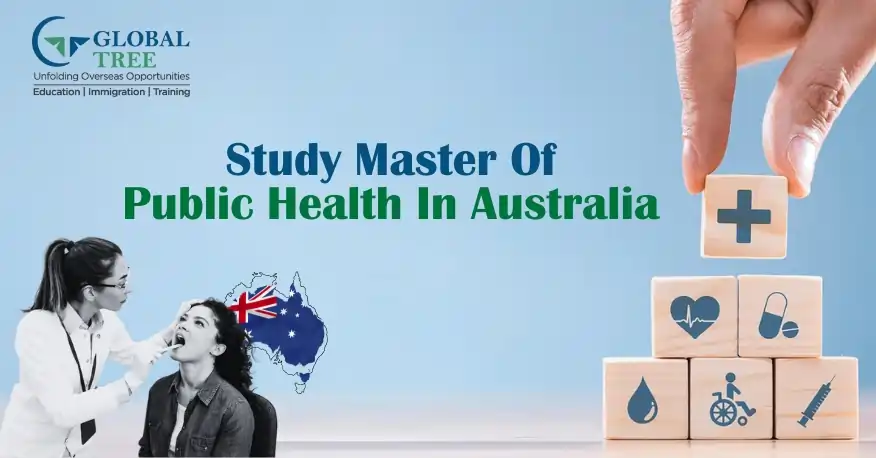Study Master of Public Health in Australia for International Students: Giving Global Health Leaders the Tools They Need to Do Their Jobs

- Introduction
- About the Master of Public Health programme:
- Specialisations for a Master of Public Health:
- How to Get a Master of Public Health:
- Syllabus for the Master of Public Health:
- Books that are important:
- The best universities in Australia for a Master of Public Health:
- Masters in Public Health in Australia Fees:
- Scholarships for international students studying the Master of Public Health in Australia:
- Average Pay for a Master of Public Health:
- Master of Public Health: Whats in store for the future?
- Jobs for a Master of Public Health:
- Master of Public Health vs. Other Courses in the Same Field:
- Conclusion
- Master of Public Health: Frequently Asked Questions for International Students:
Introduction
Getting a Master of Public Health (MPH) in Australia is a life-changing educational experience that gives international students the information and skills they need to deal with complex public health problems on a global scale. This detailed guide shows international students who want to make a big difference in the field of public health in Australia how to get into the programme, how to get into the best universities, how much the programme costs, how to get scholarships, how their careers are likely to go, and a lot of other helpful information.
About the Master of Public Health programme:
What does getting a Master of Public Health mean?
A Master of Public Health programme focuses on the study of public health, disease prevention, health promotion, health policy, epidemiology, biostatistics, environmental health, and social factors that affect health. It gives students the skills they need to play important parts in improving health outcomes, running public health programmes, and influencing policies that support health. Australia creates a welcoming environment to study or plan your career.
Who Needs to Study Master of Public Health?
The programme is great for people from a wide range of backgrounds, such as health workers, researchers, policy analysts, social scientists, and anyone else who wants to make a positive difference in local, national, and global public health problems.
Why Would You Want to Study Public Health in Australia?
Australia is a great place for foreign students to study because of its commitment to public health, its world-class universities, its multicultural society, and its active research community. When you study public health in Australia, you can get involved in cutting-edge research, learn from experts, and get a wide range of hands-on experiences that will improve your education.
Here are some fast facts about Master of Public Health:
Duration: The length is usually between 1.5 and 2 years, based on the university and how the courses are set up.
Subjects: Epidemiology, biostatistics, health policy, health promotion, and environmental health are some of the most important subjects.
Specialisations for a Master of Public Health:
Master of Public Health programmes in Australia often give students a choice of specialisations so they can focus their studies on a certain area of public health. Some of the most popular specialties in MPH programmes are:
- Epidemiology is the study of disease patterns, risk factors, and how health effects are spread among groups of people.
- Global Health looks at health problems from a global point of view. It looks at things like infectious diseases, differences in health care, and global health policy.
- Health Promotion and Disease Prevention: Focuses on improving health and preventing diseases through community-based interventions, education, and policy advocacy.
- Health Policy and Management looks at health care systems, policy analysis, health economics, and the control of public health programmes.
- Environmental health is the study of environmental factors that affect health, such as the quality of the air and water, the health of workers, and the evaluation of environmental risks.
How to Get a Master of Public Health:
To be eligible for a Master of Public Health programme in Australia, applicants usually need a bachelor's degree in a relevant area, such as health sciences, life sciences, social sciences, or a related field. Some programmes may have conditions that have to do with public health.
- English Language Proficiency: If a student is not from an English-speaking country or has not already studied in English, he or she may need to take a standard test like the IELTS or TOEFL to show that he or she can speak and write in English.
- Statement of Purpose: Applicants are often asked to write a well-written statement of purpose about their background, motivation, job goals, and interest in public health.
- Recommendation letters: Applicants may be asked to provide recommendation letters from academic or professional sources.
Syllabus for the Master of Public Health:
The course schedule for a Master of Public Health programme can be different depending on the university and the area of focus. But the following are usually the most important parts of the curriculum:
- Epidemiology: This course covers the basic ideas of epidemiology, as well as how to plan studies, analyse data, and look into disease outbreaks.
- Biostatistics focuses on the statistical methods used in public health research, such as data analysis, inferential statistics, and study design.
- Health Promotion talks about ways to promote health, change behaviour, help people in the community, and talk about health.
- Global Health looks at health problems around the world, foreign health organisations, infectious diseases, and differences in health.
Books that are important:
Depending on the programme and university, different textbooks and reference books may be suggested for Master of Public Health students. Some of these books are:
- Leon Gordis's "Epidemiology: with STUDENT CONSULT Online Access"
- The book "Introduction to Biostatistics" by Robert R. Sokal and F. Rohlf, James.
- "The Spirit Level: Why Greater Equality Makes Societies Stronger" was written by Richard Wilkinson and Kate Pickett.
- "Principles of Health Equity" was written by Patti Verbanas and Reuben Warren.
- Richard Skolnik's "Global Health 101"
The best universities in Australia for a Master of Public Health:
Australia is home to prestigious universities that offer excellent Master of Public Health programmes. These programmes give international students access to high-quality education, research chances, and a supportive learning environment. Here are a few of Australia's best universities known for their MPH programmes:
1. Sydney's University:
- The Master of Public Health programme at the University of Sydney covers a wide range of topics in public health, such as statistics, health promotion, global health, and health policy.
- The learning experience is made better by the university's strong focus on research, its experienced teachers, and its partnerships with public health organisations.
Top Universities to Study in Australia
2. Melbourne's University:
- The University of Melbourne's Master of Public Health programme is known for its thorough coursework and focus on evidence-based public health practise.
- The university's location in Melbourne, which has a lot of health and study institutions, gives students the chance to meet new people and learn about public health problems in the real world.
3. The University of Monash:
- The Master of Public Health programme at Monash University puts an emphasis on practical skills, research, and critical thought in the field of public health.
- The university's focus on innovation, teamwork across disciplines, and global health projects helps students learn more about public health on a global scale.
4. Queensland University of Technology:
- The University of Queensland's Master of Public Health programme has specialised tracks that let students focus on areas like epidemiology, health promotion, and health economics.
- Research is a big part of life at the university, and it has strong ties to public health departments. This makes for a rich educational experience.
5. The Australian National University (ANU):
- The Master of Public Health programme at ANU focuses on policy analysis, health systems, and research to prepare students for leadership jobs in public health.
- The fact that the university is in Canberra, close to government offices and policy-making bodies, gives it a unique perspective on how health policy is made.
Masters in Public Health in Australia Fees:
The education costs for Master of Public Health programmes in Australia depend on the university, the length of the programme, and whether you live in Australia or somewhere else. The average cost of tuition for a foreign student is between AUD 25,000 and AUD 50,000 in one year. When making a budget, international students must take into account extra costs like living fees, textbooks, and health insurance.
Cost of living in Australia: University wise!
Scholarships for international students studying the Master of Public Health in Australia:
Many universities in Australia that offer Master of Public Health programmes to foreign students offer scholarships and other financial aid. The goal of these scholarships is to reward academic achievement, support diversity, and make it easier for students to go to college. International students can look into the following possibilities for scholarships:
- Australia Awards Scholarships: These scholarships are paid for by the Australian government and help students from certain countries study in Australia, including in the area of public health.
- Endeavour Postgraduate grants: International students from participating countries can apply for these grants to help pay for their postgraduate studies in Australia.
- Scholarships offered by the university: Many universities have scholarships for foreign students who want to enrol in Master of Public Health programmes. These scholarships may pay for things like tuition, living bills, or travel costs.
- External Scholarships: International students can also look into scholarships given by government agencies, foundations, and organisations in their home countries that help pay for studies abroad.
- It is important to check the eligibility requirements, application deadlines, and papers needed for each scholarship. To get a grant, you have to compete with other people, so getting ready early is important.
Scholarships in Australia you should know before applying
Average Pay for a Master of Public Health:
The average pay for people with a Master of Public Health in Australia can change based on experience, job role, industry, and location, among other things. Graduates with an MPH often work in different jobs in government health departments, non-governmental organisations (NGOs), research institutions, healthcare agencies, and international health organisations. On average, public health workers in Australia can make between AUD 60,000 and AUD 90,000 or more per year, based on their area of specialisation and the job market.
Master of Public Health: Whats in store for the future?
With a Master of Public Health, you can work in many different fields, such as public health, health promotion, policy research, epidemiology, and global health. Graduates have the information and skills they need to help with health programmes, research projects, and making policy. Here are some possible jobs you could get after finishing the programme:
- Public Health Officer: Work in government health departments, local councils, or foreign health organisations to create and implement public health policies, programmes, and initiatives.
- Epidemiologist: Look at patterns of disease, do study, and help with public health surveillance to keep track of and stop the spread of diseases.
- As a health promotion specialist, your job is to create and run campaigns, community-based programmes, and training programmes that improve health.
- The job of a Health Policy Analyst is to look at healthcare policies, figure out how they affect people, and make suggestions based on the facts.
- Global Health Consultant: Work on global health projects, work with foreign organisations, and deal with global health problems on a larger scale.
Jobs for a Master of Public Health:
After getting a Master of Public Health in Australia, grads can look for a wide range of jobs in the public health sector:
- Health Programme Manager, you will plan, implement, and oversee public health programmes that try to improve the health of the community.
- Health researcher, you will do research projects, look at data, and help come up with evidence-based public health practises.
- Health educator, you make educational materials, run workshops, and raise people's knowledge of health in communities and hospitals.
- Health Policy Advisor: Provide experience in analysing health policy, take part in making policy, and speak up for public health projects.
- Health Data Analyst looks at health data, trends, and patterns to help make decisions and public health plans.
Jobs and Internships in Australia for Post-Study Options
Master of Public Health vs. Other Courses in the Same Field:
A Master of Public Health is a specialised programme that focuses on the health of an entire community, the prevention of diseases, the promotion of health, and health policy. Even though there are related classes in healthcare, epidemiology, and health sciences, a Master of Public Health gives you a full understanding of public health theory, strategies, and interventions. Here is a comparison with some other classes that are similar:
- Master of Health Administration (MHA) vs. Master of Public Health (MPH):
A Master of Health Administration degree works on healthcare management, healthcare systems, leadership, and healthcare policy. It works more on the administration and management of health care organisations. An MPH, on the other hand, looks at broader public health issues and interventions at the population level.
- Master of Epidemiology vs. Master of Public Health:
A Master of Epidemiology is a degree that focuses on the specific study of disease patterns, risk factors, and how health results in populations are spread out. It is a specialised programme for people who want to do study in epidemiology. An MPH, on the other hand, covers a wider range of public health topics, including epidemiology.
- Master of Global Health versus Master of Public Health:
A Master of Global Health focuses on health problems from a global point of view, such as infectious diseases, differences in health, and foreign health policy. There are some similarities between a Master of Public Health (MPH) program's global health specialisation and a Master of Global Health (MGH) program's focus on foreign and global health.
- Master of Health Promotion vs. Master of Public Health:
A Master of Health Promotion focuses on health education, behaviour change, community-based interventions, and methods for promoting health. It is perfect for people who want to plan and run health promotion programmes, while an MPH gives a broader background in public health.
Conclusion
Getting a Master of Public Health in Australia is a great way for international students to make a good difference in public health, learn useful skills, and contribute to meaningful projects that improve health and healthcare. Students can start a rewarding journey that prepares them for successful careers in the fast-paced field of public health if they have access to top-tier colleges, a variety of specialisations, scholarship options, and a helpful learning environment. When foreign students decide to study public health in Australia, they open the door to a world of knowledge, new ideas, and the chance to be a part of the global effort to make communities healthier and the future brighter for everyone.
Master of Public Health: Frequently Asked Questions for International Students:
Can people from outside Australia get a Master of Public Health degree in Australia?
Yes, Master of Public Health programmes in Australia are open to students from all over the world. Many universities accept students from other countries and offer services that are designed to help them do well in school.
What kinds of jobs can you get in Australia with a Master of Public Health?
Graduates of Australia's Master of Public Health programme can work in public health, government health departments, research institutions, non-governmental organisations, healthcare organisations, and foreign health agencies. They can work in jobs linked to public health programme management, policy analysis, epidemiology, health promotion, and global health.
During the Master of Public Health programme, are there ways for foreign students to get hands-on experience?
In Australia, many Master of Public Health programmes offer hands-on learning opportunities like internships, fieldwork, and study projects. Students can use what they've learned in the real world, gain useful skills, and make links in the public health field through these opportunities.
How can foreign students who want to study Master of Public Health in Australia find a place to live?
Universities in Australia often help foreign students find housing and give them resources to do so. Students can look into housing choices on campus, off-campus rentals, and the university's services for student housing.
Is there a chance for foreign students with a Master of Public Health to find work in Australia?
- International students on a student visa (subclass 500) in Australia may be able to get the
- Temporary Graduate (Subclass 485) visa, which lets students who have finished their studies work in Australia for a short time. How long the visa lasts varies on what level of study was done. This gives Master of Public Health pupils a chance to work in Australia after they finish their programme.









